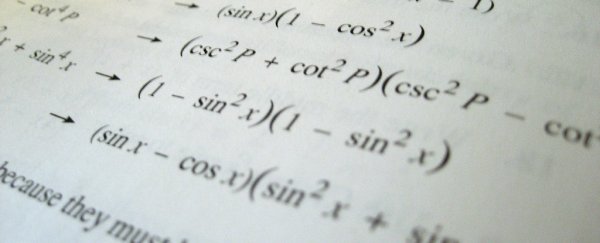For lefties, the world can be a tough place. Scissors are awful, you're always awkwardly elbowing the person next to you while you write, and don't even get me started on the ink smudge problem.
But new research suggests that, despite all the challenges, left handers might be better at maths than their right-handed peers - especially if you happen to be left-handed and a teenage boy.
The link between handedness and mathematical ability has been studied for decades, with mixed results. The hypothesis is that some lefties use different parts of their brain to process tasks, and this could give them some subtle advantage when it comes to maths.
But while some studies have shown that left handers perform slightly better at arithmetic, just as many papers have found no difference between the two groups.
Now, in one of the largest studies of its kind, a team of scientists led by the University of Liverpool in the UK has investigated the mathematic performance of 2,300 students in Italy, aged between six and 17.
Each of them had their level of handedness rated by a test called the Edinburgh Handedness Inventory (which you can take here). This determines whether some is extremely left- or right-handed, ambidextrous, or somewhere in between.
The participants then took a series of maths tests, including basic arithmetic and problem-solving, to see whether the hand they favoured influenced their results.
After considering other factors such as age and gender, the team found that the hand a student preferred actually explained about 5 to 10 percent of their variation in maths scores.
"This study found there is a moderate, yet significant, correlation between handedness and mathematical skill," said lead researcher Giovanni Sala. "Moreover, the amount of variance in the maths scores explained by handedness was about 5-10 percent, a surprisingly high percentage for a variable like handedness."
So there does appear to be a link between handedness and maths ability, and right now, no one is sure why it exists. But - and this is a big but - the link was more complex than expected, and it varied depending on the participants' age and gender.
For example, both male and female children who clearly favoured one hand over the other - so who were either extremely left- or right-handed - seemed to perform the worst compared to the rest of their peers.
But this effect disappeared in left-handed male teenagers, who performed much better than their right-handed buddies.
"We found that the degree of handedness predicted mathematical performance in different ways, according to age, type of task, and gender," Sala told The Daily Mail. "It's not easy to convey the message. We ran five experiments, and in every experiment the relationship between math performance and handedness was different."
The research has been presented at the 2016 British Psychological Society annual conference, and has yet to be published in a peer-reviewed journal, so we need to take the findings with a big pinch of salt.
But the hope is that this work might take us closer to finally understanding the alleged differences between left and right handers, and hopefully using those result to make education more productive and fairer for everyone.
It might also help us figure out once and for all why roughly 10 percent of the population is left handed, and how that's determined biologically - something that's still a pretty big mystery for scientists.
"These results must not be considered definitive," said Sala, "but only a step towards the conception of a new and more comprehensive model of the phenomenon; a model able to account for all the discordant outcomes reported so far."
